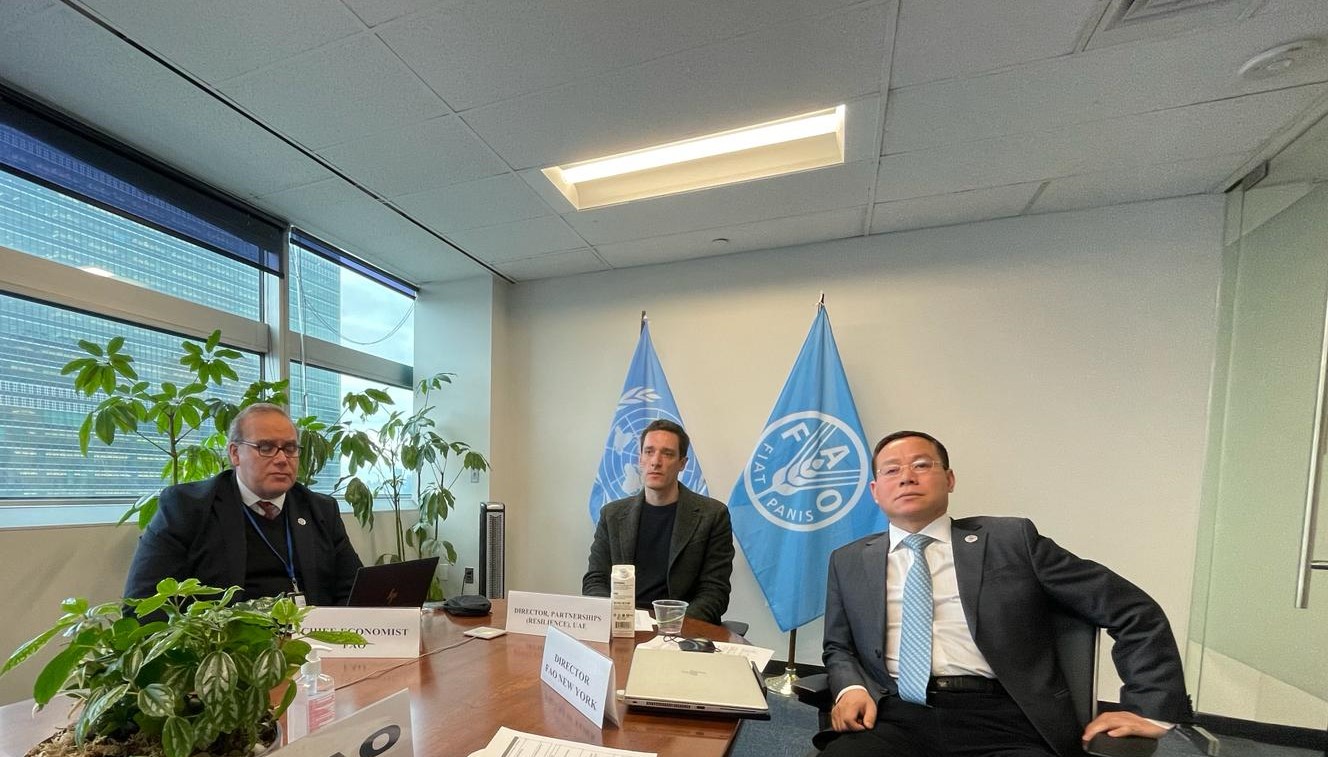Moving from declarations to action - COP28 Outcomes: Addressing climate change through agrifood systems solutions
COP28 Outcomes: Addressing climate change through agrifood systems solutions

©FAO
30 January, Brussels/Geneva/New York/Rome/Washington D.C. – In a bid to emphasize the transformative potential of agrifood systems in responding to climate change and ensuring good food for today and for tomorrow, the FAO Liaison Offices in New York, Brussels, Geneva and Washington D.C. joined forces with the Office of Climate Change, Biodiversity and Environment to brief and engage Members, stakeholders and partners on COP28 outcomes and the way forward.
“If we don’t look at food security and nutrition together with climate actions, we will not be able to achieve a just transition to secure good food for all, for today and for tomorrow," said FAO’s Chief Economist, Maximo Torero Cullen during his presentation on the FAO Global Roadmap for Achieving Sustainable Development Goal 2 (SDG2) without Breaching the 1.5°C Threshold.
Agrifood systems and climate change, two sides of the same coin
Climate change has a direct impact on our food security and nutrition. Agrifood systems – encompassing all aspects of the production, distribution and consumption of food – are responsible for around 30 percent of carbon dioxide equivalent emissions. It is clear that agrifood systems and climate change are inextricably linked, and that if we hope to address climate change, we must also account for and look closely at agrifood systems and their transformation.
The event served to highlight the role of agrifood systems in helping to achieve SDG 2 within a 1.5 ° Celsius scenario, with the Director of the FAO Liaison Office with the United Nations in New York, Guangzhou Qu, stating that “agrifood systems also present opportunities and climate solutions.” Director Qu went on to further elaborate that “Efficient, inclusive, resilient and sustainable agrifood systems can help mitigate emissions, reverse environmental degradation, adapt to climate change, and ensure livelihoods of family farmers and small-scale producers around the world.”

FAO Chief Economist, Maximo Torero, Office of the United Arab Emirates Special Envoy For Climate Change, Dane McQueen, and Director of the FAO Liaison Office with the United Nations in New York, Guangzhou Qu, during the opening session of the event. ©FAO
An urgent call for climate and agrifood systems action
In the opening session, FAO and guest speakers brought home the message that agrifood system solutions are climate solutions, touched upon ways to achieve the ambitious commitments set out and demonstrated that although the world is moving from declaration to implementation, it is simply not fast enough. Dane McQueen from the Office of the United Arab Emirates Special Envoy For Climate Change assured participants that one of their priorities is “ensuring there is support for stakeholders to follow through on commitments made” in order to “keep momentum going towards #COP29 and #COP30, taking the Emirates Declaration forward." The Director of the FAO Office of Climate Change, Biodiversity and Environment, Kaveh Zahedi, presented FAO’s engagement at COP28 and the crucial role of agrifood systems in climate change adaptation and mitigation, in relation to the Global Stocktake, Loss and Damage, the Sharm el-Sheikh joint work on implementation of climate action on agriculture and food security, and the Global Goal on Adaptation. He spoke with a sense of urgency “We are already supporting countries to put climate solutions into practice in their agrifood systems. Now is the moment to really scale-up these efforts".
UNEP’s James Lomax, Sustainable Food Systems and Agriculture Programme Officer, also underlined the how agrifood system solutions can achieve multiple benefits for climate change, biodiversity, and the environment, and the need to leverage different constituencies - including those working on the environment - to understand the importance of agrifood systems.
A panel discussion was moderated by the Swiss Youth for Climate (SYFC) representative Adel Ramdani, who also emphasized the importance of youth involvement in the climate negotiations to ensure that youth interests are well-represented. The discussion panel featured a number of voices from diverse sectors, including UN Foundation’s Ryan Hobert, a member of the World Farmers’ Organisation, Loureen Akinyi Awuor, and EU Climate Negotiator Herwig Ranner. The general consensus reached was that all stakeholders, including civil society, governments, foundations, and the private sector, need to come together to deliver on agrifood system commitments. It was also noted that lack of access to climate finance to invest in the agriculture sector is a barrier in making this happen, and that smallholder farmers hold the key to transforming food systems.
The event also featured remarks by representatives from Azerbaijan and Brazil, who will be the hosts of COP29 and COP30, respectively. Dilara Abdullayeva, Counsellor of the Permanent Mission of the Republic of Azerbaijan to the United Nations Office and other international organizations in Geneva, highlighted the importance of agricultural workers, in particular women and their vital role for sustainable agriculture and food systems, and noted that Azerbaijan is ready to collaborate with all stakeholders in an inclusive fashion to make COP29 a success.
Marcelo Morandi, Head of Office, International Relations at the Brazilian Agricultural Research Corporation (EMBRAPA), added that food security equals peace, and that building sustainable food systems also includes essential components, initiatives and policies for social protection such as safeguards for traditional communities, indigenous peoples, women and children. He also noted Brazil’s commitments in taking forward the momentum from the previous COPs.
The closing remarks of the Director of the FAO Liaison Office with the European Union and Belgium, Raschad Al-Khafaji, reflected this: “Moving forward, let's ensure that the momentum generated during COP28 is not just a moment but a continuous force.” He also announced the upcoming first regional presentation of the FAO Global Roadmap in Brussels bringing together key European stakeholders.
